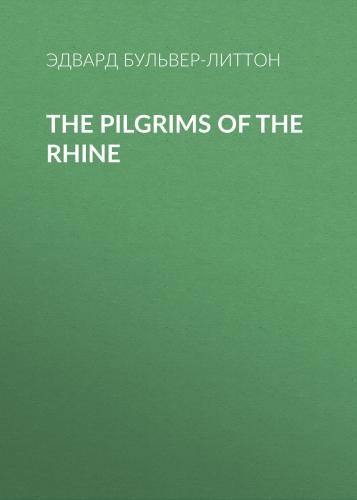To wonder’s realm allures the earnest child;
To the chaste love refines the instinct wild;
And as in waters the reflected beam,
Still where we turn, glides with us up the stream,
And while in truth the whole expanse is bright,
Yields to each eye its own fond path of light,—
So over life the rays of Genius fall,
Give each his track because illuming all.
Hence is that secret pardon we bestow
In the true instinct of the grateful heart,
Upon the Sons of Song. The good they do
In the clear world of their Uranian art
Endures forever; while the evil done
In the poor drama of their mortal scene,
Is but a passing cloud before the sun;
Space hath no record where the mist hath been.
Boots it to us if Shakspeare erred like man?
Why idly question that most mystic life?
Eno’ the giver in his gifts to scan;
To bless the sheaves with which thy fields are rife,
Nor, blundering, guess through what obstructive clay
The glorious corn-seed struggled up to day.
But not to you alone, O Sons Of Song,
The wings that float the loftier airs along.
Whoever lifts us from the dust we are,
Beyond the sensual to spiritual goals;
Who from the MOMENT and the SELF afar
By deathless deeds allures reluctant souls,
Gives the warm life to what the Limner draws,—
Plato but thought what godlike Cato was.4
Recall the Wars of England’s giant-born,
Is Elyot’s voice, is Hampden’s death in vain?
Have all the meteors of the vernal morn
But wasted light upon a frozen main?
Where is that child of Carnage, Freedom, flown?
The Sybarite lolls upon the martyr’s throne.
Lewd, ribald jests succeed to solemn zeal;
And things of silk to Cromwell’s men of steel.
Cold are the hosts the tromps of Ireton thrilled,
And hushed the senates Vane’s large presence filled.
In what strong heart doth the old manhood dwell?
Where art thou, Freedom? Look! in Sidney’s cell!
There still as stately stands the living Truth,
Smiling on age as it had smiled on youth.
Her forts dismantled, and her shrines o’erthrown,
The headsman’s block her last dread altar-stone,
No sanction left to Reason’s vulgar hope,
Far from the wrecks expands her prophet’s scope.
Millennial morns the tombs of Kedron gild,
The hands of saints the glorious walls rebuild,—
Till each foundation garnished with its gem,
High o’er Gehenna flames Jerusalem!
O thou blood-stained Ideal of the free,
Whose breath is heard in clarions,—Liberty!
Sublimer for thy grand illusions past,
Thou spring’st to Heaven,—Religion at the last.
Alike below, or commonwealths or thrones,
Where’er men gather some crushed victim groans;
Only in death thy real form we see,
All life is bondage,—souls alone are free.
Thus through the waste the wandering Hebrews went,
Fire on the march, but cloud upon the tent.
At last on Pisgah see the prophet stand,
Before his vision spreads the PROMISED LAND;
But where revealed the Canaan to his eye?—
Upon the mountain he ascends to die.
Yet whatsoever be our bondage here,
All have two portals to the phantom sphere.
What hath not glided through those gates that ope
Beyond the Hour, to MEMORY or to HOPE!
Give Youth the Garden,—still it soars above,
Seeks some far glory, some diviner love.
Place Age amidst the Golgotha,—its eyes
Still quit the graves, to rest upon the skies;
And while the dust, unheeded, moulders there,
Track some lost angel through cerulean air.
Lo! where the Austrian binds, with formal chain,
The crownless son of earth’s last Charlemagne,—
Him, at whose birth laughed all the violet vales
(While yet unfallen stood thy sovereign star,
O Lucifer of nations). Hark, the gales
Swell with the shout from all the hosts, whose war
Rended the Alps, and crimsoned Memphian Nile,—
“Way for the coming of the Conqueror’s Son:
Woe to the Merchant-Carthage of the Isle!
Woe to the Scythian ice-world of the Don!
O Thunder Lord, thy Lemnian bolts prepare,
The Eagle’s eyry hath its eagle heir!”
Hark, at that shout from north to south, gray Power
Quails on its weak, hereditary thrones;
And widowed mothers prophesy the hour
Of future carnage to their cradled sons.
What! shall our race to blood be thus consigned,
And Ate claim an heirloom in mankind?
Are these red lots unshaken in the urn?
Years pass; approach, pale Questioner, and learn
Chained to his rock, with brows that vainly frown,
The fallen Titan sinks in darkness down!
